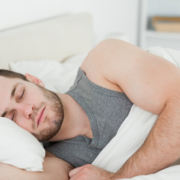Lower Back Pain When Sleeping: Which Position is Best?
Sleep. New parents chase it, Type A personalities fight it, but everyone needs it. Thing is, most people don’t get enough of it. According to the National Sleep Foundation, 45 percent of adults in the United States report that in a seven day period, lack of sleep affected their daily activities.
Sleep quantity is not as much of a problem as sleep quality. Around 35 percent of people who said they slept for 7 or 8 hours a night, still reported that their sleep quality was “only fair” or “poor”. 20 percent said that they did not feel refreshed upon waking. When a person is dealing with pain, such as lower back pain, it can make it even more difficult to get a good night’s sleep.
The Importance of Sleep
Sleep is vital for good health. The Centers for Disease Control (CDC) cites insufficient sleep as a contributing factor to a variety of conditions including obesity, diabetes, depression, and cardiovascular disease. It is also a significant contributing factor in many machinery related crashes, work site accidents, and automobile accidents. Leading to injury, disability, and even death.
Sleep allows your body to heal and the spine to rejuvenate. It helps you handle stress better and manage pain more effectively. It is an important part of good health so making sure that you get good quality sleep should be a priority – and it is possible. These are the best sleep positions to get your best sleep when you have lower back pain.
Stomach Position
Sleeping on your stomach is usually the least back friendly sleep position, but some people can’t sleep any other way. Take the strain off of your back by supporting it with a pillow under your lower abdomen and pelvis. Using a pillow may put too much stress on your back, so you might need to try to sleep without one. Another alternative is to use a flatter, less fluffy pillow. Try different positions, such as drawing one leg up or splaying your legs more until you find one that is right for you.
Back Position
If you sleep on your back you likely won’t be comfortable just lying flat. Try different positions such as, placing a rolled towel under your knees or the small of your back to provide added support. Use a good pillow to support your neck. There are pillows that are made specifically for people who sleep on their backs; you may want to give it a try.
Side Position
Many people with lower back pain find sleeping on their side to be the most comfortable sleep position. If you sleep on your side, pull your knees up slightly so that they are almost perpendicular from your body. You may have to make some adjustments to how bent your legs are, before you find a position that takes the pressure off of your back. Place a pillow between your thighs and knees. You may want to use a body pillow to provide even more support all along your legs.
A Word about Your Pillow and Your Bed
The position that you sleep in can help relieve your back pain, but getting good quality sleep will help you manage your pain much better so it should be your goal to get good, restful sleep every night. You should change out your pillow on a regular basis.
Pillows can get worn and no longer deliver the support they once did. If you are waking up with neck or back pain or headaches it could be your pillow. Additionally, studies show that making your bed every day improves your quality of sleep. Make sure that the temperature is comfortable and avoid electronic devices for about an hour before bedtime. Be good to your body; make sleep a priority.


